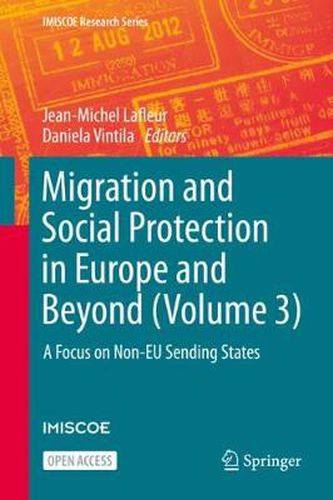Readings Newsletter
Become a Readings Member to make your shopping experience even easier.
Sign in or sign up for free!
You’re not far away from qualifying for FREE standard shipping within Australia
You’ve qualified for FREE standard shipping within Australia
The cart is loading…






This third and last open access volume in the series takes the perspective of non-EU countries on immigrant social protection. By focusing on 12 of the largest sending countries to the EU, the book tackles the issue of the multiple areas of sending state intervention towards migrant populations. Two mirroring chapters are dedicated to each of the 12 non-EU states analysed (Argentina, China, Ecuador, India, Lebanon, Morocco, Russia, Senegal, Serbia, Switzerland, Tunisia, Turkey). One chapter focuses on access to social benefits across five core policy areas (health care, unemployment, old-age pensions, family benefits, guaranteed minimum resources) by discussing the social protection policies that non-EU countries offer to national residents, non-national residents, and non-resident nationals. The second chapter examines the role of key actors (consulates, diaspora institutions and home country ministries and agencies) through which non-EU sending countries respond to the needs of nationals abroad. The volume additionally includes two chapters focusing on the peculiar case of the United Kingdom after the Brexit referendum. Overall, this volume contributes to ongoing debates on migration and the welfare state in Europe by showing how non-EU sending states continue to play a role in third country nationals’ ability to deal with social risks. As such this book is a valuable read to researchers, policy makers, government employees and NGO’s.
$9.00 standard shipping within Australia
FREE standard shipping within Australia for orders over $100.00
Express & International shipping calculated at checkout
This third and last open access volume in the series takes the perspective of non-EU countries on immigrant social protection. By focusing on 12 of the largest sending countries to the EU, the book tackles the issue of the multiple areas of sending state intervention towards migrant populations. Two mirroring chapters are dedicated to each of the 12 non-EU states analysed (Argentina, China, Ecuador, India, Lebanon, Morocco, Russia, Senegal, Serbia, Switzerland, Tunisia, Turkey). One chapter focuses on access to social benefits across five core policy areas (health care, unemployment, old-age pensions, family benefits, guaranteed minimum resources) by discussing the social protection policies that non-EU countries offer to national residents, non-national residents, and non-resident nationals. The second chapter examines the role of key actors (consulates, diaspora institutions and home country ministries and agencies) through which non-EU sending countries respond to the needs of nationals abroad. The volume additionally includes two chapters focusing on the peculiar case of the United Kingdom after the Brexit referendum. Overall, this volume contributes to ongoing debates on migration and the welfare state in Europe by showing how non-EU sending states continue to play a role in third country nationals’ ability to deal with social risks. As such this book is a valuable read to researchers, policy makers, government employees and NGO’s.